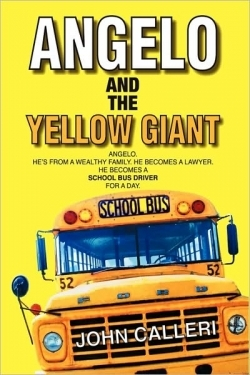Angelo and the Yellow Giant
Angelo and the Yellow Giant, by former school bus driver John Calleri, tells of the title character’s fascination with school buses—also referred to as yellow giants. Angelo’s obsession begins when he is a teenager. When he becomes a lawyer, he finds himself behind the wheel of such a vehicle, ostensibly doing research for a case. He ends up taking himself and his kindergarten passengers on a wild ride.
The author clearly has affection for buses and students, but his first novel fails to translate his love for the job into an effective story. The trouble begins before the story even starts, as readers are provided with a glossary of pronunciations used in the book and their English equivalents. For example, for is written as fer’ and our as awr’. Angelo speaks in this accent, and the constant use of apostrophes after his words detracts from the authenticity of his speech. The non-standard spelling of the dialect also creates unnecessary work for readers who must decipher Angelo’s meaning. In addition, odd, incorrect word usage and phrasing further obfuscates the plot, as when the protagonist reports to the bus garage for work:
“GOOD MORNING,” Angelo announces sharply in a drawn-out, clear long pronunciation, which he thinks may have revealed that he’s a prerequisite person. Realizing his dialogue greeting error, he clears his throat with a cough in hopes to divert his mild blunder.
The capitalization of good morning is symptomatic of Calleri’s overuse of italics, boldface, and capital letters to emphasize words, as though he means for the entire manuscript to be read with vehemence. Comma splices abound. The author overuses conjunctions to connect ideas that would be better served by being in separate sentences. Sloppy uses of verb tenses occur as Calleri sometimes switches from present tense (Angelo says) to past tense (Angelo said) without reason.
The novel’s plotting is amateurish. It seems inconceivable that young children would be generally happy to ride around for hours with a driver they barely know as he speeds and endangers their lives. While the students do in fact get upset, they all love Angelo by the end, despite being on the bus until nine p.m. The rightfully concerned parents are vilified. Key plot threads are left unresolved. The seeds of a worthwhile story exist here, but they remain, unfortunately, well-hidden.
Reviewed by
Jill Allen
Disclosure: This article is not an endorsement, but a review. The publisher of this book provided free copies of the book and paid a small fee to have their book reviewed by a professional reviewer. Foreword Reviews and Clarion Reviews make no guarantee that the publisher will receive a positive review. Foreword Magazine, Inc. is disclosing this in accordance with the Federal Trade Commission’s 16 CFR, Part 255.

